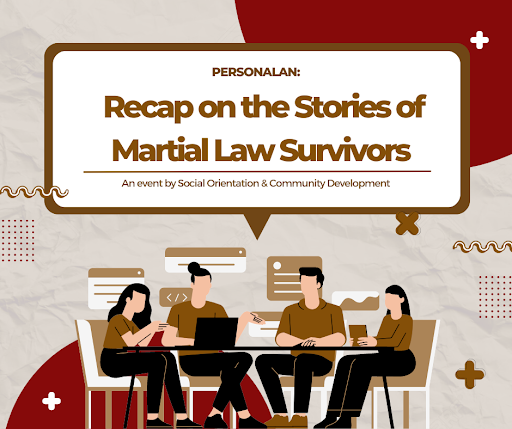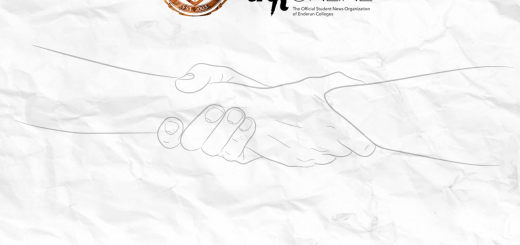Personalan: Recap on the Stories of Martial Law Survivors

Authors’ Note: Viewers discretion is advised. Article contains graphic details.
In the early morning of September 21, flocks of Enderun students seated themselves within various corners of the Titans’ Annex Building. Others remained comfortably settled on class chairs, while groups of friends huddled closely together. For those who weren’t at the Annex- you could find them scattered in classrooms and open grounds. Despite the different locations, positions, and ideals, that morning of September showed one clear agenda that all of Enderun Colleges agreed upon- the Commemoration of the 50th Martial Law Anniversary.
At 10:30 AM, hundreds of students entered the Zoom call and were warmly welcomed by the fond banter between Ms. Maria Lourdes “Malu” Maniquis and Mr. Jose “Pepe” Alcantara- two former student leaders of SAMASA UP Diliman. While the opening remarks consisted of fun coffee questions by hosts Nicole Zalameda and Francesfaith Reyes, the latter introduction of Dean Ed gave students a jolting awakening perhaps no cup of coffee could offer. As stated by the beloved dean, “Today, dear students, you must protest any attempts that revise the truth about Martial Law. And, you must not be afraid to voice concern on any steps you see that could lead to a revival of the Martial Law. Do not be afraid. That is why we are here today, in alliance. Thank you for your presence.” With that, a quiet but compact solemnity entered the call, leaving the spotlight for Ms. Malu and Sir Pepe to discuss tales then untold.
Originating from Batac, Ilocos Norte, Mr. Pepe begins his account by stating that his story is not one that is easy to discuss. Growing up, his family stood as loyalists to former president Marcos Sr. Nonetheless, during his time as a UP student, his rose-colored glasses came off and he began to see the injustices towards the Filipino people. He notes that similar to the thousands affected by Martial Law, his life holds a degree of pain and sadness preferably undiscussed. Nonetheless, he bravely faces the meeting and explains to watchers that everything said is from his point of view as a protestor. As he continuously remarks, “I am an activist and will always be an activist.”
For Sir Pepe, he divides his Martial Law experience into five periods. First and foremost, the period of shock and immobility. Starting from 1972, the former student leader states that this was the year of the Martial Law Declaration. “We were trying to decipher what happens now and where we go from here,” he calmly explains. “It was a period of control and utter helplessness.”
Then, ranging from 1976 to 1981, was the stage of reorganization, reformation and awakening. As he states, “gumising na ang mamamayan, nakakakita na sila.” During 1977, Sir Pepe highlighted that this was the revival of the Student Council in UP Diliman, indicating that for a period of time, the regime did not permit student leaders to exist for fear of rebellion. In fact, an assembly of five or more individuals were considered illegal during the previous timeline. Thus, during the 70’s, young Pepe aimed to become more socially sensitive. With his newfound learnings, he joined the student council and led in both academic and socio-political fields.
Continuing, he remembers the exact day the third period began- August 21, 1983, the day democratic opposition- Ninoy Aquino was shot and passed away. The inevitable period of the descent of Martial Dictatorship bloomed: a place where Filipinos began to live again. This all occurred until the February of 1986 wherein millions of Filipinos gathered in EDSA to call upon the dying end of an authoritarian regime.
Still, Sir Pepe explains that the fifth period was his personal experience. “Saan ako? Saan kami (activists)?” He construes that he was a part of the 1976 period of awakening. With his active participation in the SAMASA organization, he was publicly expelled from the Mga Anak sa Batac organization. Still, this did not deter his spirit and he went on to fight for democracy and freedom of speech.
Because of this, he was issued an ASSO (detention that needs no warrant of arrest) and was held in a 6×6 room with only one miniscule window painted in black (so prisoners become disoriented with the time). His detention lasted from 1979 to 1981, one where he was not given a chance to protect himself. Nevertheless, Sir Pepe carries empathy and compassion for both sides of the Martial Law. He reveals there was a young officer who would bring him outside the cell and offer him xiaobao and mami everyday at 3 AM. Through these short conversations, Mr. Pepe remarks that he was learning their military mindset and possibly, “the young soldier was also learning from me.”
Through tireless studies and academic focusing, Mr. Pepe now aids the nation as an adviser in infrastructure and economic projects. He ends his Martial Law story with the reminder that, “bottomline, I am forever an activist.”
While Mr. Pepe holds a certain degree of compassion for all those affected and influenced by the Martial Law, Ms. Malu reinstates the immorality of Marcos Sr. and his people and how the current generation has failed due to the lack of education in the Political Dynasty of the Marcoses. She points out that the upper class holds power over elections and supports the success of ‘authoritarian leaders.’ Thus, through the observation of social media influence, Ms. Malu now posts educational documentaries on various platforms, such as Youtube.
But before she works as a script writer, she looks back onto her past. The day when Martial Law was declared, young Malu and her siblings were gathered in the living room and told by her father that they would no longer be allowed to go to school. In her school uniform at just ten years old, the sudden information gave enlightenment to what she was feeling. “Kahit bata ako, I know the feeling of freedom. The freedom of movement, to watch what you want to watch, to say what you want to say and that was stripped away.” For a period of time, she noticed implementation of curfews where she and her siblings were no longer allowed to play outside, news outlets and their discontinuation and the unbearable radio silence that unfurled the true essence of the Martial Law.
“Immediately, we were taught a lesson.” With the abrupt announcement, young Malu’s parents (who were also Marcos loyalists) began to reshape their children’s views. “They began to teach us to stay critical and analytical.” Her mother, a previous private school teacher, shifted to a public university in order to maintain the flame of Philippine education. Through her parents, Ms. Malu saw the ignorance brought by the Marcos Dictatorship and pushed her energy into training the less fortunate. She says, “The Martial law served as a ‘mask’ to the reality Filipinos were actually facing- the fact there was no source of real information.”
Thus, during her years as a UP student, she participated in the student council and protested in her first rally against the Effect of Education Act 1982 where she got tear gassed. Yet, during her 5:30 PM Spanish Class, Ms. Malu walked in and stayed to listen to work on her tasks. Even before her rallying days, Ms. Malu remarks that she already knew she was an activist in her own way. She actively joined in theater and performed, moreover, wrote pieces that captured her struggles with Martial Law. As the years moved on, Ms. Malu wanted to define her experiences in a more objectively manner- one that could reach thousands of people and tell them straightforward stories of what happened. Thus, she began her journey as a documentary maker and script writer for ABS-CBN.
One noticeable factor to Ms. Malu’s resilience and tough spirit was her parents’ upbringing. She remarks, “Parents play a crucial role in children’s social stances and how they see the world. Kaya, mga parent, become more open in discussing things with your kids.” With her parents’ willingness to change, she found herself shifting from ideals and standing firmly on the truths she believed in.
At 3:00 pm the same day another story had to be uncovered. It was the experiences of Dr. Nestor Castro under the Marcos’ Regime. Dr. Nestor is currently a professor of anthropology at the University of the Philippines Diliman and specializes in cultural anthropology. His works have been published in notable journals such as Les Temps Modernes, New Asian Visions, Colloquium: The new horizon of contemporary sociological theory, Philippine social sciences review, Kasarinlan, and Diliman Review.
“I was twelve year old when Martial law was declared.” Dr. Nestor shared that his first experience under Martial law was the night of september 23, 1972 where he and his family were awakened by big megaphones stating that all men and boys should line up outside their houses and then someone would pinpoint activists amongst the lined men then they would be arrested. During that time, men with long hair and wearing bell bottom pants were perceived as rebels, any grouping of five was considered as an illegal assembly, and all student government and publications were suspended.
“Technically speaking Martial Law ended in 1981 but in reality it existed until 1986.” Dr. Nestor graduated from university in 1980. A year later, as an anthropologist he relocated to Baguio City in order to work among the Igorots and other indigenous people around the area. Then his traumatic experiences under the Marcos dictatorship began.
In February 1983, Igorot students were violently dispersed in Baguio city by the local police because they were protesting for the Grand Cañao to be held. It is a sacred ritual among the Igorots and is usually done during burials and marriages but the rules under the martial law did not allow them. A month later, Dr. Nestor was part of a group called “Alyansa ng mga mag-aaral sa Baguio” protesting the violent dispersal of Igorot students. On March 7, 1983, he was simply distributing leaflets about the violent dispersal of Igorots in front of Baguio Central University when the military approached him, arrested and escorted him to the Baguio city hall where they took his fingerprints along with the photographs and leaflets he was distributing and then later on was released. Two days later, March 9, his boarding house was raided by the Philippine constabulary and he and his girlfriend were illegally arrested and brought to camp dangwa in La Trinidad Benguet. “There was no warrant of arrest, and there was no search warrant” Dr. Nestor frustratedly emphasized. During their ride to La trinidad benguet, the arresting officer told them that he and his girlfriend were just being invited for questioning, but that invitation lasted until December 1983, they were illegally detained.
“We were called political prisoners because we were being detained for our beliefs.” During his detention he testified that he was being tortured by the military. Specifically on March 26, 1983, Dr. Nestor reported to Baguio City regional trial court about his torture inside camp dangwa. His testified his experience about torture when he was asked to squat at the office of the Philippine constabulary the whole day and when the officers would see him sitting due to fatigue, the military would beat him up, burn his chest with cigarettes, and bang his head against the wall. “I experienced a whole day of torture” he mentioned. He also testified in court that there was a week where he was kept in solitary confinement, he was not allowed to go outside, he eats and drinks inside the cell, he even urinates and defecates inside the cell without a toilet. The judge at the court asked the military to conduct a medical examination on him for evidence of torture and assured Dr. Nestor that they would resolve the case in a week. The medical examination happened one month after when most of his bruises were no longer there.
“We are on fast for our release” starting November, Dr. Nestor and the six other detainees launched what they called “foodless Thursdays” where they would fast every Thursday as they entered their eighth month of detention at camp dangwa. December 1, 1983, they started their hunger strike where they did not eat nor drink anything until they collapsed and were brought to prison. They planned to do their hunger strike until December 10 because it marks human rights day but they didn’t last. On December 7, 1983 President Ferdinand Marcos ordered their release because he did not want Baguio to be as noisy as Manila.
These stories represent the “Lost Generation”, they were the generation that did not exist because of Martial law and they were not heard and were mistreated while a lot of people these days do not believe that these are the things that happened under the Marcos Dictatorship. Never again as we celebrate its 50th anniversary, we should never forget the injustice our fellow Filipinos had under the Martial Law.





